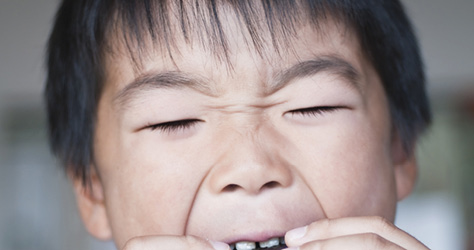What to do when your toddler bites, kicks or hits
It can be difficult to know what to do when your toddler bites, kicks or hits another child. Here’s some advice.
At a glance
- Most toddlers will go through this stage so don't worry - it is normal!
- It is often because they can't cope in a social situation or they are over-excited
- Stay calm but act quickly and decisively

Most toddlers go through an aggressive phase, so don’t panic that your child is going to turn into a psychopath in later life if they start biting you or whacking their friend with a plastic dinosaur.
Under two's
In the under twos, aggressive behaviour can start out as curiosity (‘what will happen if I sink my teeth into Mum’s leg?’). Then when they discover it causes quite a reaction, they’re keen to try it again and again because it’s a great way to get your attention.
Two to three-year-olds
Later on, between two and three, violent behaviour such as hitting, punching, kicking, throwing and biting, can be the result of a swirling mix of emotions in your pre-schooler; Frustration that they can’t do everything they want, Anger that they don’t have more control over their lives and Annoyance that they can’t yet express themselves very well. Their brains haven’t yet developed control over their impulses, either. It all adds up to the perfect recipe for lashing out.
Why they do it?
Sometimes children bite other children when they can’t cope with a social situation, or because they’re over-excited. When they bite you it’s often a sign that they are upset by changes in their life (a new baby in the house, for example). It can even be a misplaced demonstration of their love.
What to do
The key is to be calm when it happens, but act quickly and decisively. If your pre-schooler has bitten or kicked someone, immediately take them away from the situation, sit them down somewhere away from the fray and explain that biting/hitting/kicking is wrong because it can hurt a person. Don’t ignore the aggressive behaviour or wait too long before acting. And don’t embark on a lengthy investigation of who did what to whom first. Just calmly swoop in and take them away.
Never be tempted to bite or kick them back to show them how it feels, as it can encourage violence. Even if you’re really embarrassed, try not to shout or lash out.
Keep it simple: don’t get into an elaborate discussion about the ethics. Saying ‘how would you feel if someone bit you?’ won’t mean anything to a three-year-old because they haven’t got enough empathy to put themselves in someone else’s shoes. Use simple language like, ‘we don’t bite because it hurts people and makes them sad’.
Let them go back to playing after a few minutes but if it happens again, be prepared to act quickly and take them away for the rest of the session and perhaps leave it a few weeks before going back.
Keep asking them ‘what’s the rule?’ (‘that’s right, we don’t hit’) so they are reminded of the behaviour you want. Make sure you do lots of praising when they play nicely.
Three to four-year-olds
When they get to aged three to four, if they've got reasonable language skills, you can help your little one put their feelings into words instead. So instead of lashing out at their friend because they snatched a toy, encourage them to say something like, ‘when you take my toy you make me angry’.
“Keep explaining patiently why it’s important to care about someone else’s feelings. Say, “that hurts, or that upsets your friend”, showing calm but clear disapproval. It’s never helpful to bite or hit back: acting aggressively to children only makes them more aggressive in the long-run.”
Parenting expert Eileen Hayes